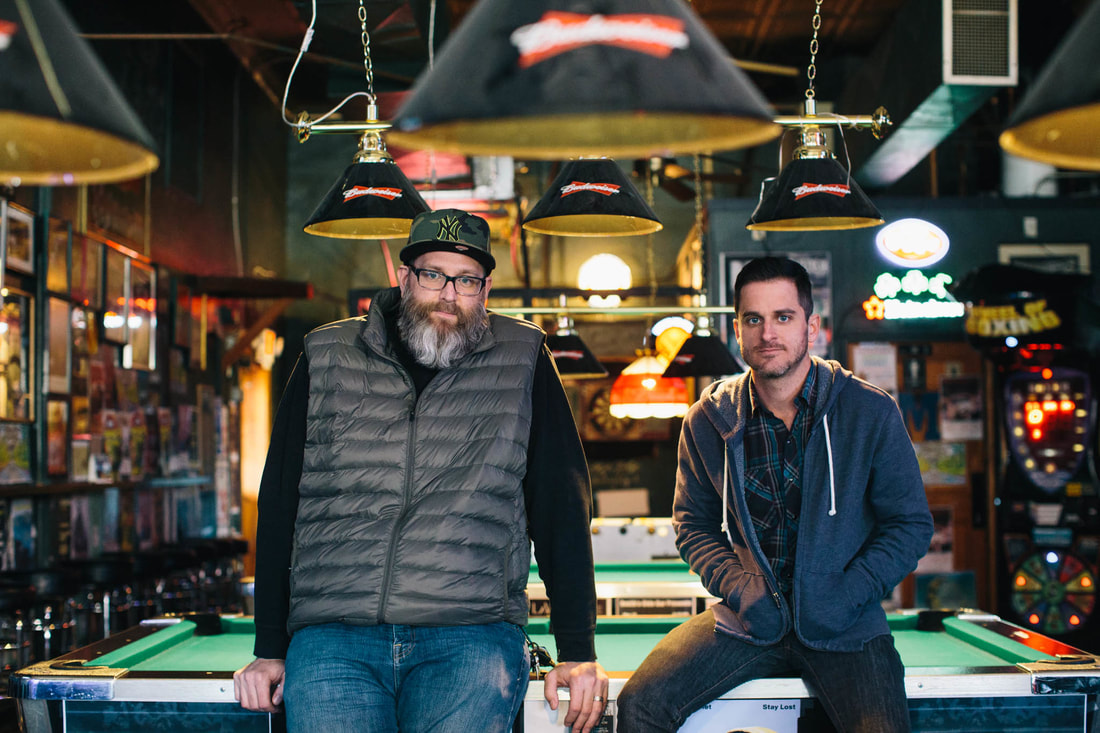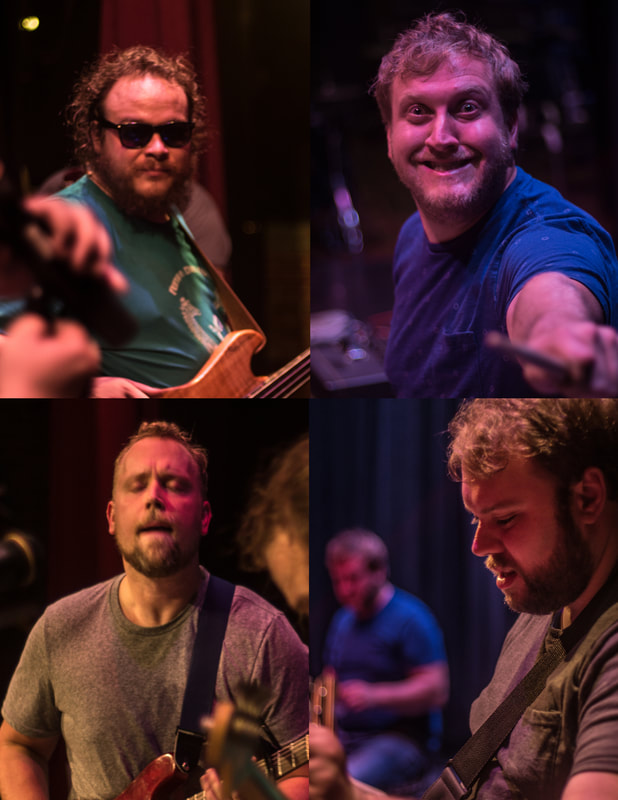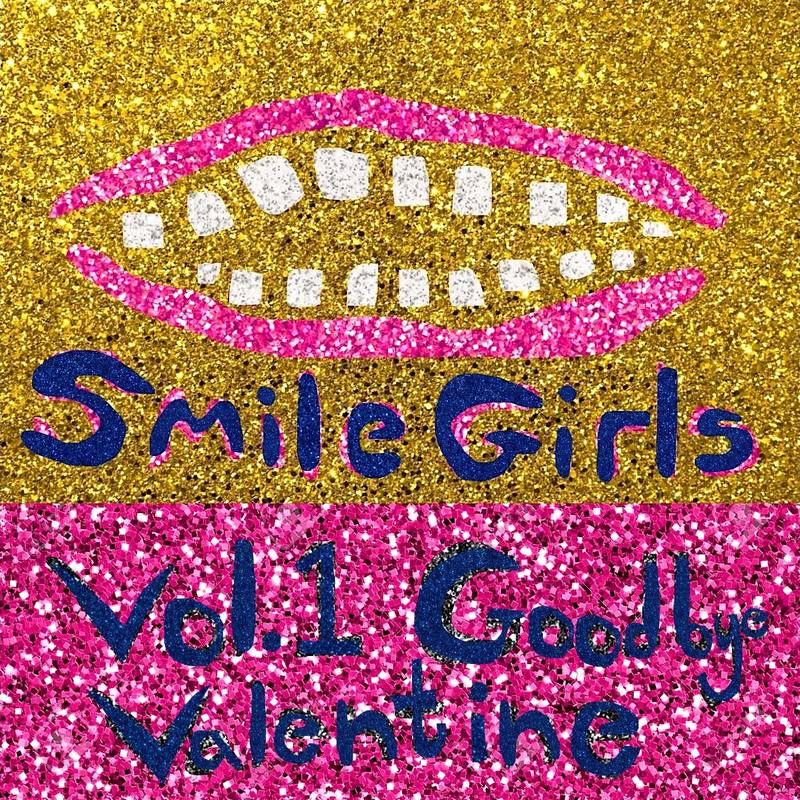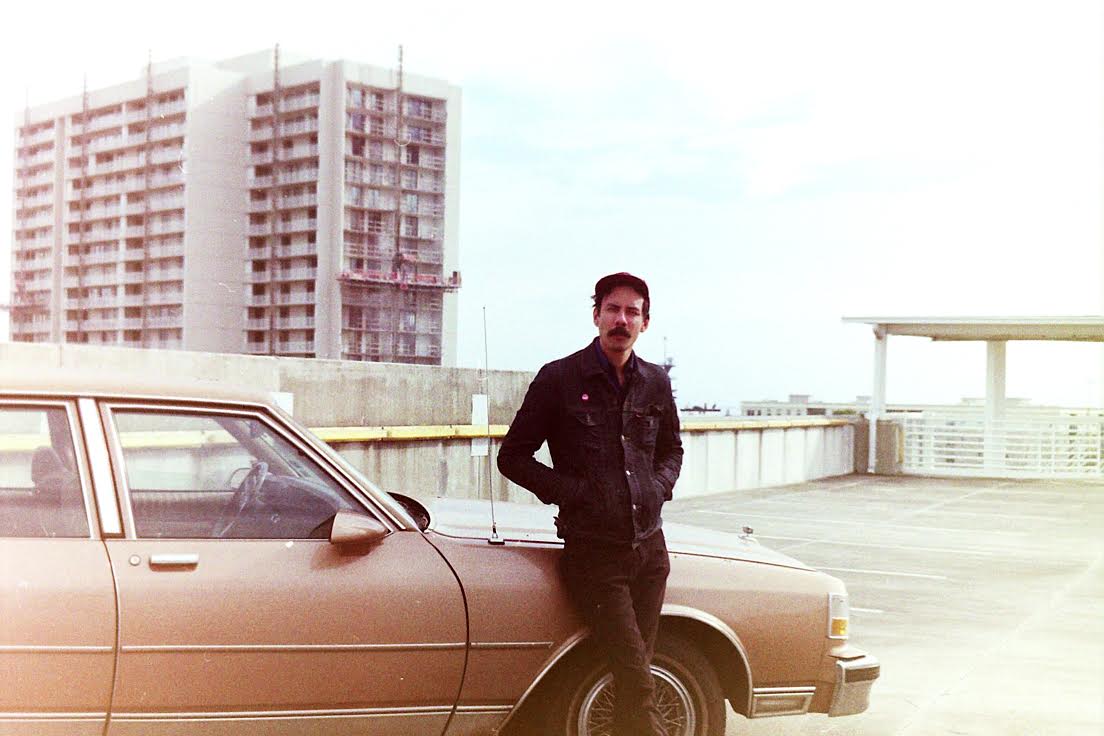 Youth Model’s “Symmetry” is a melodically upbeat rock song that is as catchy as it is chilling. “Symmetry” evokes a dream collaboration between Ric Ocasek’s winning pop sensibilities and Thom Yorke sci-fi paranoiac lyricism. Singer Matt Holmes’ lyrics weave a glitched-up postmodern narrative about fear and singularity. When the bridge lights up with Holmes’ fugue state malfunction of “I’m finding it all myself, / I’m fighting it off myself” the song is crystalized before re-spawning with its eerily metronomic chorus. Youth Model’s drummer Randy Borawski joined me for a chat about the song, co-writing, and the spirit of Charleston. You can pick up a copy of Symmetry here. SC: I love how the song’s bright music creates a tension between the lyrics. Can you tell me about this choice? Matt and I are big fans of 90's rock: Toadies, Smashing Pumpkins, Del Amitri, and Toad The Wet Sprocket and of course the Big Three from Seattle: Pearl Jam, Nirvana and Soundgarden. That's where our reference point lies, but we continue to evolve our tastes as newer acts have come on the scene. Well, newer than the aforementioned, bands, like Wilco, Kings of Leon, The Strokes and Spoon. For the drum sound, we're referencing Nirvana's In Utero. I think the drum sound is a bit more slick than that record, but still has that big and loud feel. As far as the tension between the lyrics goes, Matt explains that all he can write are sad songs. Even if they appear to be musically upbeat, chances are the subject matter of the lyrics is dark and dreary. SC: At the end of the second verse Matt sings “So we'll go without sleep / while they're sharpening their teeth / watch as we slip right by / don't pay no mind anyway.” Can you tell me a little about these lyrics? RB: Symmetry as a whole is is basically about not letting fear and trepidation pull you away from having close relationships with people, whether that be your spouse, girlfriend or friends even when things get messy. We all know relating to people can be a challenge sometimes. As far as the exact meaning of these particular lyrics, we leave the interpretations up to the listener. SC: Tell me about writing “Symmetry”. RB: Matt is the main songwriter in Youth Model. Once he's written a tune, he'll send us fully realized demos with him playing drums, singing, playing guitar, bass and/or keys. Then, I take the idea or direction of the drum parts on the demo and make it my own. Ben, our guitarist, then adds in his parts. Once we get in the studio together with our producer, we make final arrangement decisions, doubling choruses here, changing intros, outros and bridges there, etc. SC: Can you tell me about the band's writing process? Do you write daily or wait for inspiration? RB: Matt writes when the time allows and inspiration hits him. He has said that he writes his songs around the chorus, and there is a main theme in a song, but the lyrics are open to interpretation. He tends to write in stream of consciousness mode. SC: How does your community of songwriters inspire you? RB: I think the spirit of the Charleston music scene as a whole inspires us to write and perform live at a high level. Even though the days are gone of million dollar record deals, we want to make the best music we think our band can make as we continue grow as musicians.
1 Comment
Skymonk’s “To Have And To Hold” blends the plea of a failing marriage with an apocalyptic backdrop of guitars. The song is ensconced in smart clatter with call and response guitars, which suggest the circular questioning of the lyrics. The second verse picks up with Kelly Nash’s wooly images of America and post modern melancholy, “Now we need assistance / we can’t run in this car alone. / We’re so tired from the road”. The four-piece band's smart counterpoint balances out the anxious message with Nash’s closing provocation “come on truth and dare”. Nash joined me for a brief chat about friends, early morning writing, and finishing songs.
You can listen to To Have And To Hold here. SC: I hear a call and response between the guitars in the song. Can you tell me about how that relates to the message of the song? KN: The call and response is an element representative of the speakers in the story, the conversation between the two lovers. We imagined it as the way an argument works, people talking over one another, spilling into each other's speech with moments of brief silence then bursts of volume and expression. Granted, there is only one perspective from the lyrics, we wanted to represent the other party musically. The story of this song is a snapshot of a marriage falling apart. SC: Tell me a little about this lyric in the second verse “Now we need assistance / we can’t ride in this car alone. / We’re so tired from the road”. KN: This lyric is further explaining the struggle at hand in the second verse. 'Assistance' refers to family support. The car is representative of the family. The "we can't ride in this car alone" also refers to the children that are part of this picture, referenced again later in this verse with "But we're alive and we're doing fine". "We’re so tired from the road” is describing that you can't combine certain chaos with family. The speaker tried for a while but the chaos one person brings makes the whole family "so tired from the road". SC: Tell me about writing “To Have and To Hold” KN: This song was hard to write. Its inspiration comes from a dear friend of ours, his very real turmoil and ultimate end of his marriage. This song, he wrote all the lyrics in their entirety, I only helped edit. We wrote "To Have and To Hold" in late 2015 and started playing it live to test the water. The song is different from the rest of our work and I wasn't completely sure it fit. However, we loved playing it because it's a challenging piece of music and the ferocity behind the lyrics that drive the tune and the energy. I love that quality about the song. SC: Can you tell me about your writing process? Do you wait for inspiration? Or do you write on a schedule? KN: I write consistently in the early mornings, whether that's guitar riffs/ideas or lyrics or record on my phone chord patterns or melodies. There are roughly 80 something ideas/riffs currently sitting in my phone. That certainly doesn't mean they're all good, hah. My problem is finishing songs, always has been. Some days, a couple really great ideas make their way to the page or recorder that can be reworked and tweaked to become something really worth working on. Other days, nothing shows up and I end up noodling. But over the past year or so my writing process has gotten much more disciplined. I take one idea and compile an arrangement, then bring it to the band. We then work on them together as a group and everyone writes their own parts. We look for feedback from each other as we move through a tune to ensure we're serving the song best. Everybody has to feel the song if we're going to continue pursuing it, otherwise it ends up getting thrown out. SC: How does your community of songwriters inspire you? KN: I'm blown away by some of the talent and musicality we have here locally. I find myself humming a melody line from one of the groups in town and I aim to try and create something like that, an infectious melody or idea that finds it's way into your head when you're doing something else. That inspires me to write better and makes me very much aware I need to step up my game. I can always write better and I have much to learn. We're excited to play a small part in our songwriting community and continue writing and releasing new material, maybe in the process, inspiring others to do the same. Gabbie Watts is a champion of the Atlanta music scene. When she’s not busy riffing and writing, she’s recording her super talented friends. Highlights include the Cuntry tune “Fast and Furious” which features a charming blend of condemnation and clear-eyed wit, or Kristen Englenz yearning ballad “Winning Hand”, and Total Babe’s vivid confessional “Most of the Time”. But that’s not all. The collection is a vibrant menagerie of voices; Adelaide Tai, Amy G Dala, Casey Hood, and HAINT. It’s a great soundtrack for challenging the patriarchal status quo or for just having a night in. Gabbie joined me for a chat about Smile Girls, the sexual politics of recording studios, and tour plans.
SC: Can you tell me about the inspiration behind this project? GR: I've been recording myself and my band, but I wanted to expand my skills and record other people. So, some of my friends graciously agreed to letting me record them. Each recording was very much a collaborative process, and by the end of each session, I hoped that the musicians felt empowered and like they had total control over their product. Through these compilations, I want to get hella good at engineering so that I can teach other women how to engineer. I'm super inspired by organizations like Girls Rock Camp and re:imagine/ATL, which use empowerment to teach kids how to creative, awesome things that make them feel better about themselves. I want to do something similar but with recording. Also, being a woman is stupid hard for a variety of reasons, and women's voices have often been shut out in primarily male spaces . . . like a music studio. So, hopefully, one day, we can have a big ol' community in Atlanta and beyond that is equal, has all the representation, and is open to everyone's voice, talent, and ideas. And that starts by infiltrating all parts of the music industry. SC: Tell me an anecdote about the making of this compilation. GR: I loved how experimental people were with the very weird instruments I have lying around my house. Stone Irvin a.k.a. Haint plugged in this horrible sounding theremin that I have, and after she played with it a bit, we blended several takes together. It sounds like Mordor and the Upside Down had a baby. I love it. SC: Why are you interested in building community? GR: There was this article the New York Times wrote about the "Shalane Flanagan Effect," which is "You serve as a rocket booster for the careers of the women who work alongside you, while catapulting forward yourself." That's basically it. We can make ourselves great while making everyone great. SC: Can you tell me a little bit about inspiration behind the title? GR: Smile Girls was a joke with my bandmates taking condescending language from men and then using it ourselves. I think we said it a couple times while playing live in a terrible singsong voice, "smile, girls!" It's similar to Cuntry, taking offensive language about women and owning it. SC: What’s happening with Cuntry? GR: Cuntry is the twin sister to Gabbie Rotts, and she is taking a break to explore herself. Gabbie Rotts plays some of the same songs but is much louder and obnoxious and sarcastic and less flirty. What’s next for Gabbie Rotts? We're recording an album in April. That will probably come out in the summer . . . but you know how these things go. We also are going on a tour de east coast in May and June, and I AM SO EXCITED! Gold Light’s “Bloom” is a satisfying blend of anxious hallucination and earnest pop. “Bloom” utilizes a two-chord structure throughout it which is mirrored by singer Joe Chang’s repetition of the vowel tones. The end result is somewhere between Bo Diddley, Lou Reed, and The Yummy Fur. The song’s central tension comes to a head with Chang urging “You comfort me I’ll comfort you, / you come for me I’ll come for you” before a parting percussive reflection punctuates the song. Chang joined me for a brief chat about language poetry, inspiration, and community.
Buy Visions by Gold Light here. SC: “Bloom” repeats the sounds “-oo” and “-ai” sound throughout the composition as rhymes and internal sonic texturing. Can you tell me about that choice? JC: Yeah a lot of it comes from me just being a fan of language and having fun playing around with it, be it the sounds words make (rhyming) or alliteration, or sometimes even just nonsensical usage. Bloom was an especially fun one and exaggerates that a lot, it purposefully plays around with words more than other songs. I remember Johnnie Matthews and I recording that one and we'd just laugh at how many oo's and ai's there were, it got kind of ridiculous . . . like that line "you parlez-vous? I party too", we just thought it was silly, and made no sense, but it's actually in itself also kind of a play on language, because it asks, (in a foreign language, nonetheless), "do you speak?" and the response is, essentially, "Yeah, I like to have fun as well". Also sometimes when it comes to songs, I like to see how many words I can fit into one breathe, it's kind of a fun/slightly masochistic breathing game I play against myself. Plus the song itself is about getting high and hallucinating, so the run on sentences/stream of consciousness lyrics work for the subject matter as well. SC: Your work has a lovely tension between wordplay—“rows of roses” or “along in the tooth”, etc.—and confessional narratives. Can you tell me about how you view this tension in your work? JC: I feel like at a song's base, I'm always telling some sort of a story first. The tension is kind of just to make it interesting, at least what I was talking about having fun with language, wordplay.. But I feel like in the overall arc, there's always a narrative there, with whatever words I'm using. This album's attempt at a narrative is the cycle of love, done through recurring imagery like the metaphors of flowers and seasons and myths (Lazarus, etc).. Love dies and is resurrected (Union, Grey Eyes), it's tangible but also elusive (Arm's Length), it's dividing but also redeeming (Visions, Destiny). JC: I think this album especially was very confessional, but done in a very specific, personal, almost secretive way. I'm not sure that everyone really gets what I'm talking about half the time, as there are lots of things that have more than one meaning. Which opposes the first album, or more recent songs I've been writing, which are also very confessional narratives, but done in a very straight talking manner. SC: Can you tell me about your writing process? Do you wait for inspiration? Or do you write on a schedule? JC: It's pretty sporadic, and kind of depends on the song. I'll sit down to write a song, and nothing will come out for hours, and then sometimes I'll just be sitting at work, and an entire song will form itself in my mind from start to finish within 15 minutes. So yeah, inspiration, at least for me, is fairly elusive. I would say I tend to be very particular when forming the lyrics though. Even choosing the most mundane of words, "the" or "and" or "but" makes a very big difference.. I think Mark Twain said choosing the right word to use is like choosing the difference between "lightning" and "lightning bug". Though I also have a ton and ton of lyrics I keep in storage that I'll just cycle back through and sometimes if I'm having trouble writing I'll go back in and pick and choose from here and there, and songs will get written that way. Like I'll have this song that I don't think is very strong from years and years ago, but it's got one or two lines that find themselves getting put into a newer, better song. SC: How does your community of songwriters inspire you? A lot, I'd say. I think the best thing about creating anything is the inspiration it gives others, at least that's the biggest thing I take away from things I see or hear or watch. And I'm very lucky to have a good community of friends who are creating stuff all the time who inspire me, not just with their work, but who they are as people too. And being in Charleston, there's no shortage of good songwriters, so it's hard not to be inspired. |
The Sound Connector is an online magazine for songwriters. We feature songwriting challenges, monthly interviews, and the opportunity to discover new songwriters. We are interested in all things related to the craft of songwriting. Do you want to be featured on The Sound Connector? Send us your songs!
Categories |



 RSS Feed
RSS Feed